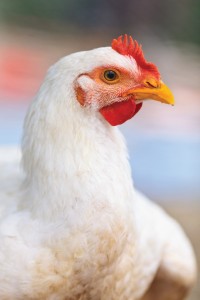Keeping chickens in the backyard is an easy, economical way to produce super-fresh eggs free of chemicals and hormones. In addition, chickens provide a good supply of manure for the compost heap or garden, eat garden waste and kitchen scraps and enjoy nothing more than grazing on your weeds. And as we all know, happy hens produce the best tasting eggs!
You can choose to raise them from baby chicks or buy ‘point of lay’ or ‘pullets’ which will begin laying within a few weeks. Crossbreeds like the White Leghorn Cross, Australorp Cross and Rhode Island Red Cross are recommended.
Chickens have about one year of peak egg production, during which the average chicken will lay about four eggs a week or 250 eggs a year. After the first year, they will molt and stop producing. In six to eight weeks they will regrow their plumage and begin to lay again, but the number of eggs will be about 10% lower than in the first year.
Some tips:
- Always consult with your neighbours before building a coop and obtaining any poultry.
- Don’t keep roosters due to noise nuisances.
- Create an easily maintained chicken coop and a warm, safe laying environment with a roosting space.
- Keep them in a safe enclosure: goannas and snakes like to eat chickens, and they may also be attacked by unleashed dogs. Chickens are also quite good at escaping, and can dig under fences.
- Keep the coop clean and treat your chickens for bugs, worms and other insects.
- Keep poultry so as not to attract rats: do not overfeed them, collect the eggs regularly, keep the coop clean and keep food in secure containers.
- Provide chickens with ample space to roam: this improves their diet and egg quality. But protect your garden as chickens like to nibble on fresh flowers and vegetables!
- Choose feed which provides adequate protein and provide plenty of food scraps and weeds to vary their diet. Coarse shell grit during peak laying periods provides calcium and aids production of good quality shells.
- Keep at least two chickens as they are friendly, sociable animals. They will become quite used to handling if you give them love and attention.
Council regulations on keeping chickens
- Poultry must not be kept under such conditions as to create a nuisance or to be dangerous or injurious to health.
- Poultry yards must at all times be kept clean and free from offensive odours.
- Fowls (that is, birds of the species Gallus Gallus – e.g. chickens) or guinea fowls must not be kept within 4.5 metres (or such greater distance as the Council may determine in a particular case) of a dwelling, public hall, school or premises used for the manufacture, preparation, sale or storage of food.
- Poultry (other than Fowls (i.e.) ducks, geese, turkeys, quals, pigeons, doves, etc) must not be kept within 30 metres of any building as referred above.
- The floors of poultry houses must be paved with concrete or mineral asphalt underneath the roosts or perches. However, this sub-clause does not apply to poultry houses:(a) that are not within 15.2 metres of a dwelling, public hall or school, or (b) that are situated on clean sand.
- Poultry yards must be so enclosed as to prevent the escape of poultry.

